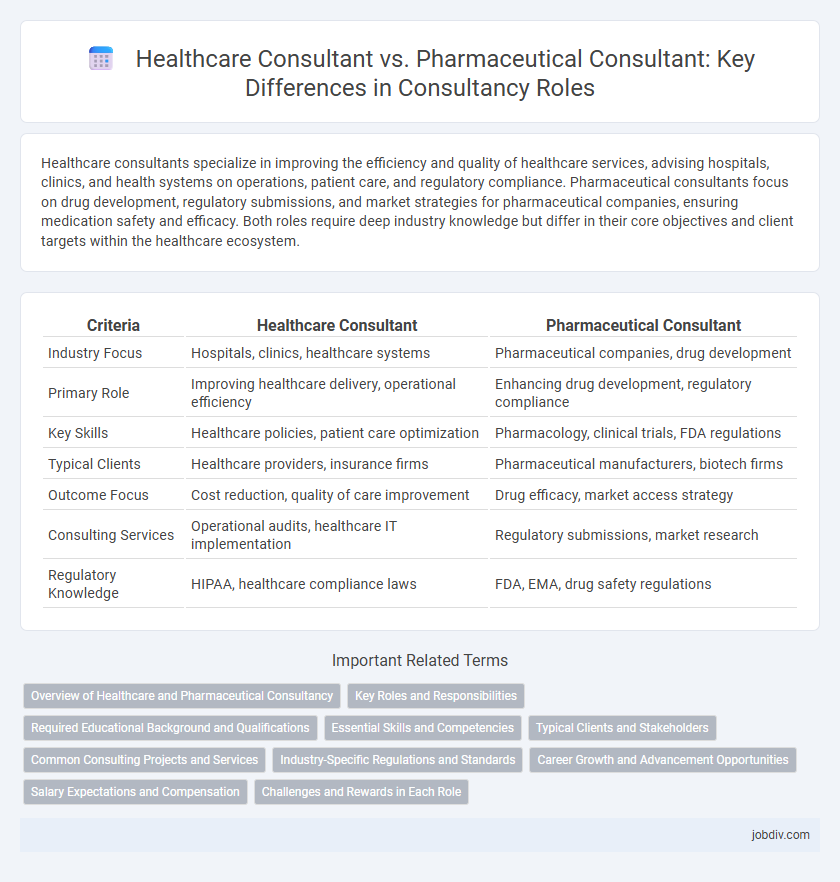Healthcare consultants specialize in improving the efficiency and quality of healthcare services, advising hospitals, clinics, and health systems on operations, patient care, and regulatory compliance. Pharmaceutical consultants focus on drug development, regulatory submissions, and market strategies for pharmaceutical companies, ensuring medication safety and efficacy. Both roles require deep industry knowledge but differ in their core objectives and client targets within the healthcare ecosystem.
Table of Comparison
| Criteria | Healthcare Consultant | Pharmaceutical Consultant |
|---|---|---|
| Industry Focus | Hospitals, clinics, healthcare systems | Pharmaceutical companies, drug development |
| Primary Role | Improving healthcare delivery, operational efficiency | Enhancing drug development, regulatory compliance |
| Key Skills | Healthcare policies, patient care optimization | Pharmacology, clinical trials, FDA regulations |
| Typical Clients | Healthcare providers, insurance firms | Pharmaceutical manufacturers, biotech firms |
| Outcome Focus | Cost reduction, quality of care improvement | Drug efficacy, market access strategy |
| Consulting Services | Operational audits, healthcare IT implementation | Regulatory submissions, market research |
| Regulatory Knowledge | HIPAA, healthcare compliance laws | FDA, EMA, drug safety regulations |
Overview of Healthcare and Pharmaceutical Consultancy
Healthcare consultancy provides expert guidance on hospital management, patient care optimization, and healthcare policy implementation, aiming to improve system efficiency and patient outcomes. Pharmaceutical consultancy focuses on drug development processes, regulatory compliance, market access strategies, and pharmacovigilance to support pharmaceutical companies in product lifecycle management. Both fields require specialized knowledge but target different stages of healthcare delivery and medical product commercialization.
Key Roles and Responsibilities
Healthcare consultants analyze hospital operations, patient care processes, and regulatory compliance to improve service delivery and operational efficiency. Pharmaceutical consultants specialize in drug development, regulatory approvals, market access strategies, and compliance with pharmaceutical regulations. Both roles require expertise in healthcare systems, but healthcare consultants focus on clinical and administrative improvements, while pharmaceutical consultants concentrate on the lifecycle of pharmaceutical products and market dynamics.
Required Educational Background and Qualifications
Healthcare consultants typically require a bachelor's degree in health administration, public health, nursing, or a related field, with many roles demanding advanced degrees like a master's in health administration or public health. Pharmaceutical consultants often hold degrees in pharmacy, pharmacology, chemistry, or life sciences, frequently requiring a PharmD or advanced scientific qualifications to navigate drug development and regulatory compliance. Both roles benefit from certifications such as Certified Healthcare Consultant (CHC) for healthcare consultants or Regulatory Affairs Certification (RAC) for pharmaceutical consultants to enhance expertise and credibility.
Essential Skills and Competencies
Healthcare consultants require strong analytical skills, knowledge of healthcare regulations, and the ability to improve patient care processes, emphasizing expertise in clinical workflows and healthcare technology. Pharmaceutical consultants must possess in-depth understanding of drug development, regulatory compliance, and market access strategies, along with skills in clinical trials and pharmacovigilance. Both roles demand excellent communication, problem-solving abilities, and strategic planning to effectively navigate their respective industries.
Typical Clients and Stakeholders
Healthcare consultants primarily serve hospitals, clinics, insurance companies, and government health agencies, focusing on improving operational efficiency, patient care, and regulatory compliance. Pharmaceutical consultants work closely with drug manufacturers, biotech firms, regulatory authorities, and research organizations to optimize product development, market access, and regulatory strategy. Stakeholders for healthcare consultants often include healthcare providers and payers, whereas pharmaceutical consultants engage with scientific researchers, commercial teams, and regulatory bodies.
Common Consulting Projects and Services
Healthcare consultants often focus on improving hospital operations, patient care strategies, and compliance with healthcare regulations, while pharmaceutical consultants specialize in drug development processes, market access strategies, and regulatory submissions. Both consultants conduct market analysis, stakeholder engagement, and organizational change management to enhance industry efficiency. Common projects include data analytics, cost reduction initiatives, and implementation of technology solutions tailored to healthcare providers and pharmaceutical companies respectively.
Industry-Specific Regulations and Standards
Healthcare consultants navigate complex regulations like HIPAA and the Affordable Care Act, ensuring compliance with patient privacy and care delivery standards across medical facilities. Pharmaceutical consultants specialize in FDA regulations, Good Manufacturing Practices (GMP), and drug approval processes, guiding companies through clinical trials and regulatory submissions. Both consultants require in-depth knowledge of industry-specific standards but apply them uniquely based on healthcare delivery versus drug development contexts.
Career Growth and Advancement Opportunities
Healthcare consultants often have broader career growth opportunities due to their involvement in diverse healthcare systems, policy development, and hospital management, enabling advancement into executive roles such as Chief Medical Officer or Healthcare Strategy Director. Pharmaceutical consultants specialize in drug development, regulatory compliance, and market access, which can lead to senior positions within pharmaceutical companies or regulatory agencies like the FDA. Both paths offer strong advancement potential, but healthcare consulting generally provides wider vertical mobility across multiple sectors within the healthcare industry.
Salary Expectations and Compensation
Healthcare consultants typically earn an average salary ranging from $75,000 to $120,000 annually, influenced by experience and specialization, while pharmaceutical consultants command higher compensation, often between $90,000 and $140,000 due to the technical expertise required in drug development and regulatory compliance. Bonuses and profit-sharing are more common in pharmaceutical consulting, reflecting the industry's profit margins and project scope. Salary expectations in both roles increase significantly with advanced degrees such as an MBA or PhD and certifications like Certified Management Consultant (CMC).
Challenges and Rewards in Each Role
Healthcare consultants face challenges in navigating complex regulatory environments and improving patient care efficiency, with rewards including impacting public health outcomes and hospital performance. Pharmaceutical consultants encounter challenges in drug development processes, regulatory approvals, and market access strategies, while enjoying rewards such as contributing to innovative therapies and influencing pharmaceutical market success. Both roles demand specialized knowledge and offer the satisfaction of advancing healthcare quality, albeit in different sectors.
Healthcare Consultant vs Pharmaceutical Consultant Infographic

 jobdiv.com
jobdiv.com